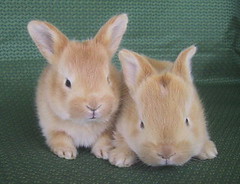I subscribe to a number of rabbit-related forums and e-mail lists, and over the past year or so, I've noticed a growing interest in raising rabbits naturally. Some people just want to move away from a "traditional" pelleted ration and brew their own rabbit diet; others are interested in something a bit more extreme like colonies and "tractoring".
I can tell that "tractoring" is conjuring images in your mind of a bunny sitting on the seat of a John Deere. [grin]
So, let me explain a little bunny Greek before we go on: a rabbit tractor (pasture pen) is a portable enclosure that combines a shelter and a pen for grazing. (They're often used for chickens and other poultry.) Every day or so, sometimes twice a day, the "tractor" is moved ahead to fresh ground. By confining them this way, rabbits can run around and stretch their legs, graze fresh forage, and remain protected from predators. It's a relatively simple concept.
A Quick History
Let's start with a quick history of rabbits so you know where we get some of our ideas in the first place. When rabbits were first bred in captivity roughly 2,000 years ago, they weren't raised in cages. The domestic rabbit's wild cousin, the "European" wild rabbit (actually native to Spain), is a burrowing creature. They dig intricate networks of underground burrows to protect themselves from predators and to shelter their young. So for the earliest rabbit breeders, it was simplest to mimic the rabbit's natural home. In fact, the ancient Romans gave their walled rabbit colonies a special name: leporaria.
In the Middle Ages, rabbit breeding began in earnest. People started raising rabbits for specific purposes, like meat, fur, and wool. Specific breeds developed. Then somewhere along the line, people discovered that breeding could be controlled much more easily if their rabbits were caged!
And so, modern rabbit husbandry evolved.
Why colonies and tractors?
Today, some of us are looking to the past for ideas. We question "unnatural" ways of raising other species of livestock, so we're looking for ways to raise our rabbits in as natural an environment as possible. The only problem is that rabbits have been raised in cages for so long that they often have a hard time adapting to "natural" husbandry. Young rabbits switched suddenly to a diet of greens may get fatal diarrhea. Rabbits raised in portable grazing pens often struggle with coccidiosis parasite infections. Rabbits fed a more "natural" diet of hay, grain, and green foods are usually less productive than rabbits fed a diet of strictly pellets.
So if colonies and tractors have so many drawbacks, why do we do it? To put it simply, we want to raise our bunnies in an environment that complements their natural instincts. Rabbits are gregarious social animals with a complex social order, so why confine them - alone - in a cage? When their instincts say "Dig a burrow!” why are we putting them on a wire mesh floor?
Frankly, do we want the rabbit barns of our future to look like this modern rabbit farm in Italy?
Modern colony raising and tractoring are still in their infancy, but I think that both have long-term potential. (Perhaps not in a commercial barn, but definitely on small farms and in backyards.) When my rabbits are in a tractor, they nibble fresh pasture, they cuddle and groom, and they have room to stretch their legs.
They seem happy.
-Hannah
If you’re curious about learning more about tractoring or colonies, here’s a link to a translated French website with some really good, detailed pictures of some tractors over there. There are also photos of creative housing methods in third-world countries. (If the link doesn’t work, here’s the original link. Click on “Cages mobiles”)
January 8, 2007
Subscribe to:
Post Comments (Atom)

2 comments:
Thank you thank you for the rabbit tractor info we have searched all over the internet and finally found your useful blog.. we will check the links thanks again from Providence Farm Folk - Jacq,Chris & Mike
Heya! thanks for the tractor info. I call mine the rabbit rickshaw. Thought I was all alone in the world. I'd like more info about successions of crops and using chickens in tandem (at different times) with chickens and cover crops. Maybe i'll have more info on that after this growing season. Cheers.
Post a Comment